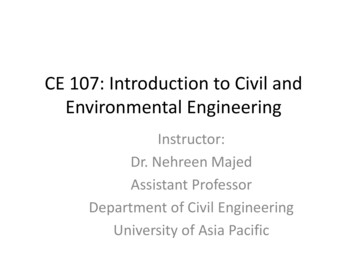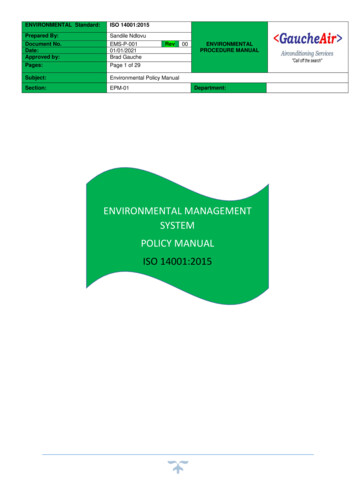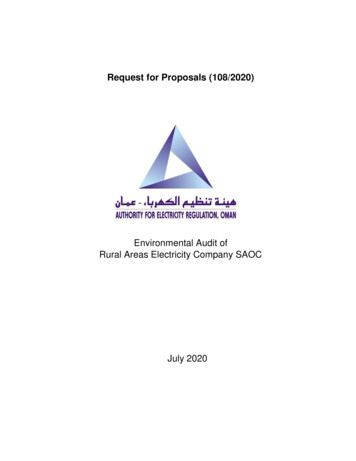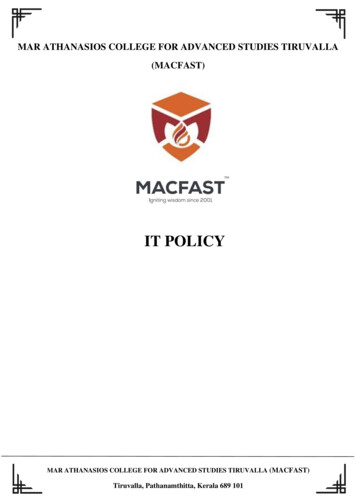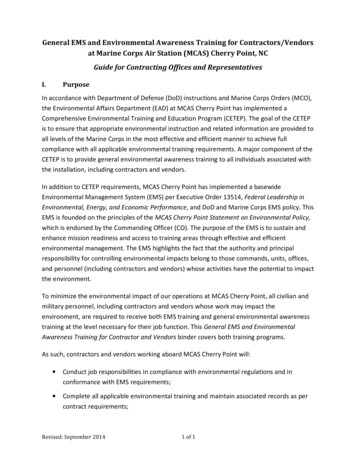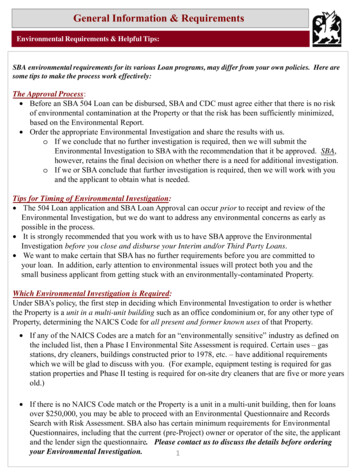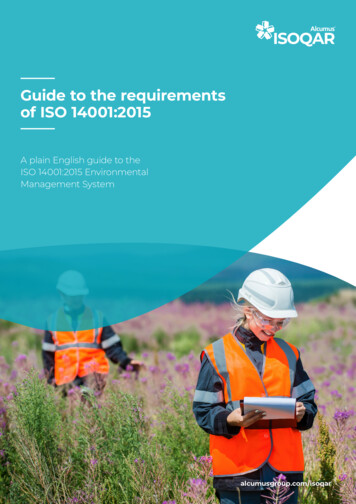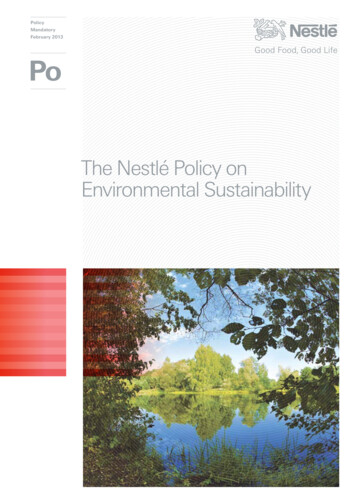
Transcription
PolicyMandatoryFebruary 2013The Nestlé Policy onEnvironmental Sustainability
PolicyMandatoryFebruary 2013Issuing departmentSafety, Health and Environmental SustainabilityTarget audiencePublic, all employeesApproverExecutive Board of Nestlé S.A.RepositoryAll Nestlé Principles and Policies, Standards and Guidelinescan be found in the Centre online repository at:http://intranet.nestle.com/nestledocsThis policy is also registered as GI-14.000.CopyrightAll rights belong to Nestec Ltd., Vevey, Switzerland. 2013, Nestec Ltd.AppendicesThis policy is complemented with more detailed commitmentson specific environmental issues available at www.nestle.comDesignNestec Ltd., Corporate Identity & Design,Vevey, SwitzerlandProductionbrain’print GmbH, SwitzerlandPaperThis report is printed on BVS, a paper producedfrom well-managed forests and other controlled sourcescertified by the Forest Stewardship Council (FSC).
Commitment of the CEO to environmentallysustainable business practicesAt Nestlé, the recognised world’s leadingNutrition, Health and Wellness company, webelieve that to be successful over the long-termwe need to create value for our shareholdersand for society as a whole. We call this CreatingShared Value (CSV). As an essential prerequisitefor CSV we not only have to comply with allapplicable legal requirements and The NestléCorporate Business Principles but also ensurethat the principle of sustainable development isembedded in our activities, brands and products.Creating Shared ValueNutrition, water, rural developmentSustainabilityProtect the futureComplianceLaws, business principles, codes of conductThis means protecting the future by makingthe right choices in an environment where wateris increasingly scarce, natural resources areconstrained and biodiversity is declining. All ofthese elements are vital for feeding a growingworld population and for the development ofNestlé. Moreover, climate change may exacerbateour Planet’s environmental challenges. Nestlé istherefore committed to: full compliance with all applicable legalenvironmental requirements and our internalrequirements where specific environmentallegislation is non-existent or insufficient; the continual improvement of theenvironmental performance of our activities,products and services and prevention ofpollution through the Nestlé EnvironmentalManagement System (NEMS) which complieswith the international ISO 14001 standard; the systematic assessment and optimisationof environmental impacts in the design of newand renovated products; the responsible sourcing of ingredients,packaging materials and other goods andservices from suppliers who comply withthe Nestlé Supplier Code and demonstratecontinual improvement of their environmentalperformance;so that Nestlé’s products will be not only tastierand healthier but also better for the environmentalong their value chain.The Nestlé Policy on Environmental SustainabilityThis also means delighting consumers by givingthem another reason to trust Nestlé and enjoyour products, and living up to employees’ andexternal stakeholders’ expectations about ourenvironmental responsibility and practices.Nestlé is therefore committed to: meaningful and accurate environmentalinformation and dialogue based on scientificevidence about our products, activities andservices at corporate, market and productbrand level; independent environmental auditing,verification and certification of our practicesand along our supply chain; environmental awareness training andeducation for our employees, alongsideeffective communication with employeesand recognition of their initiatives andachievements towards environmentalimprovement; proactive long-term engagement andpartnerships with stakeholders, includingregulators, scientists, customers, businesspartners, civil society organisations and thecommunity, in order to define, implementand evaluate solutions to the complexenvironmental challenges we are facing.As the Chief Executive Officer of Nestlé,I am determined to provide the leadership andresources to make sure that this commitmentis fully integrated throughout the Company.Paul BulckeChief Executive Officer1
Meeting our commitmentWe apply a product life cycle approach involvingour partners from farm to consumer andbeyond. Specific to our food and beveragebusiness we focus on water preservation,natural resources efficiency, biodiversityconservation, air emissions reduction, climatechange adaptation, and zero waste.1. Research and DevelopmentNestlé Research and Development centreshave two primary objectives: to create newproducts and processes and to improve thosethat already exist.In order to have environmental sustainabilitybeing more and more built into products, ourSustainability by Design Programme systematicallyassesses and optimises the environmentalperformance across the entire value chain at theearliest stage in the development of new andrenovated products.Our global Sustainability by Design Networkchampions the continuous improvement ofthis programme across the different businessesand categories.2. Sourcing of Raw MaterialsNestlé sources its raw materials either directlyfrom farmers or from primary processorsor traders. We prefer to use agriculturalmaterials which are locally available. We fosterenvironmental sustainability in the supplychain through: the Responsible Sourcing Audit Programmewhich requests key vendors to demonstratecompliance with Nestlé’s environmentalstandards through independent third partyaudits; if corrective actions are required Nestlé,together with auditors, will guide vendors inupgrading their practices; the Responsible Sourcing TraceabilityProgramme which promotes transparency inour extended supply chains back to the farmor feedstock, implementing our commitmentson no-deforestation, responsible use of water,sustainable fisheries and animal welfare,and addressing other specific environmentalaspects; the Farmer Connect Programme whichsupports the farming communities where wesource agricultural raw materials, and providestechnical assistance on sustainable productionmethods; we also optimise the delivery of rawmaterials up to the factory; the Sustainable Agriculture Initiative at Nestléwhich shares best practices and lessonslearned.23. ManufacturingManufacturing comprises all processes thatare necessary to transform perishableraw materials into safe and value-added foodproducts for consumers.Building on the ISO 14001 certification ofour factories, we aim to do more with less byeliminating all types of waste, with a key focuson what is valuable for both the environmentand our consumers. We thus improve ouroverall efficiency, quality and environmentalperformance.We aim to use the most efficient technologiesand apply best practices in order to furtheroptimise energy and water consumption,minimise waste generation, utilise sustainablymanaged renewable energy sources, recovervalue from by-products and control and eliminateemissions, including greenhouse gases.We use safe natural refrigerant alternatives forindustrial refrigeration installations and implementnew solutions to improve their performance.We incorporate environmental sustainabilityobjectives when we build, construct and renovatefacilities.4. PackagingThe packaging of our products is crucial toprevent food waste, guarantee our high qualitystandards and inform our consumers. We: optimise the weight and volume of ourpackaging; lead the development and use of materialsfrom sustainably-managed renewableresources considering packaging and productperformance requirements; support initiatives to recycle or recover energyfrom used packaging; use recycled materials where there is anenvironmental benefit and it is appropriate.The Nestlé Policy on Environmental Sustainability
5. DistributionDelivering the products in highest quality andon time from the factory to customer is a vitalpart of our business. To continuously enhanceefficiency and environmental performance indistribution, we: optimise distribution networks and routeplanning across all our operations; explore opportunities to improvetransportation, e.g. use sea and rail insteadof road; expand driver training both from a safetyand environmental efficiency perspective,use telematics and latest technology on ourvehicles where practical, and recommend thesame to our suppliers; support the development and use of safeand efficient natural refrigerant solutions forcommercial applications and progressivelyphase out HFCs appliances.6. Marketing & Consumer CommunicationMarketing’s most fundamental commitment isto delight consumers every day, everywhere,thereby building trust. As part of buildingtrust, we: integrate environmental sustainability intoour products, and brand communicationwhere applicable; help consumers make informedchoices through credible, substantiatedcommunication; leverage relevant contact points (e.g. digital,packaging and point-of-sale) to informconsumers of environmental improvements,as well as action they can take when using ourproducts and handling used packaging; support and shape the development ofenvironmental communication best practicesand standards, working in collaboration withindustry, government and public forums.8. Human ResourcesWe educate all employees to live by the Nestlécorporate business principle on environmentalsustainability We make Nestlé resourceful andtherefore, we: train all employees on this policy; create conducive workplace conditions thathelp all employees take personal responsibilityfor protecting the environment by promotingapplication of this policy to day-to-day activitiesat the workplace as well as at home; ensure environmental sustainability is coveredas part of relevant training, workshopsand meetings to raise commitment of ouremployees, suppliers, business partners andthe community at large; promote corporate and personal responsiblebehaviour towards the environment throughpublishing success stories and recognisingpositive initiatives to embed these practiceswithin Nestlé and the local community.9. RegulationWe carefully monitor, evaluate and communicateregulatory developments so that they arereflected in our strategies. To promote aneffective regulatory system with respect toenvironmental sustainability, we: engage with regulators and other relevantstakeholders to foster environmentally efficientand effective laws and regulations; support internationally recognised standardsand voluntary initiatives designed to protectthe environment; oppose discriminatory measures; favour the harmonisation of environmentallaws, regulations and standards in orderto develop trade and help consumers’understanding.7. Corporate CommunicationCommunication on the topic of environmentalsustainability is an increasingly important part ofour corporate communication strategy involvingmedia relations and engagement with nongovernmental organisations, special interestgroups, governments and public authorities.Our Nestlé in Society website features ouractivities on environmental sustainability andwater.A strategic priority for us is to engagestakeholders and develop key partnerships. Ourproactive engagement with stakeholders onenvironmental topics includes regular externalstakeholder convenings and meetings.We also seek to nurture constructive relationswith organisations critical of the Company’senvironmental performance.The Nestlé Policy on Environmental Sustainability3
GovernanceThe Board of Directors (BoD) is the ultimategoverning body of the Company. The BoDdelegates to the CEO the power to manage theCompany in line with its Articles of Associationstating that Nestlé shall, in pursuing its businesspurpose, aim for long-term, sustainable valuecreation. The CEO chairs the Executive Board(EB) and delegates to its members individuallythe powers necessary for carrying out theirresponsibilities. The BoD and the EB are assistedby a number of governance bodies coveringenvironmental sustainability, including the BoDAudit Committee as well as, at executive level, theOperations Sustainability Council, R&D Councilfor Sustainability and Nutrition, Brands & CSVAdvisory Team, Issues Round Table and GroupCompliance Committee.4.64.5Management PlanningNCE practicesImplementation and operation4.4.1. Resources, roles, responsibilityand authority4.4.2. Competence, training and awareness4.4.3. Communication4.4.4. Documentation4.4.5. Control of documents4.4.6. Operational control4.4.7. Emergency preparedness and responseThe effectiveness of NEMS will rest on the useof the methodologies, models and toolsprovided by our Nestlé Continuous Excellence(NCE) initiative. Through the application of NCEpractices, we improve our efficiency, quality andproductivity, which translates into doing morewith fewer resources and less waste. In addition,NCE fosters a systemic, employee-involved,44.1Checking4.5.1. Monitoring and measurement4.5.2. Evaluation of compliance4.5.3. Non-conformity, correctiveaction and preventive action4.5.4. Control of records4.5.5. Internal audit4.4The CSV Alignment Board, chaired by theCEO, oversees the strategic implementation ofCSV across all Nestlé businesses. It leads thedevelopment and evolution of Nestlé’s CSVand environmental sustainability objectives andstrategies, while reverting to the EB for inputand confirmation. It also liaises and ensurescoherence with our CSV Advisory Boardcomposed of internationally recognised expertsin corporate strategy, nutrition, water and ruraldevelopment who give independent input to ouractivities.This policy is implemented through theNEMS. Management is accountable for NEMSimplementation within their area of responsibility.NEMS is based on a continual improvementmanagement cycle and is depicted in thefollowing spiral:4.3.1. Environmentalaspects4.3.2. Legal and otherrequirements4.3.3. Objectives,targets andprogramme(s)continuous improvement culture that will help usfurther develop more environmentally sustainablebusiness practices in the years to come.To ensure a consistent and coherentimplementation worldwide, Nestlé submits all itsmanufacturing sites to ISO 14001 certification byindependent accredited bodies and is expandingthis programme to all its units.The Nestlé Policy on Environmental Sustainability
We educate all employees to live by the Nestlé corporate business principle on environmental sustainability We make Nestlé resourceful and therefore, we: train all employees on this policy; create conducive workplace conditions that help all employees take personal responsibility for protecting the environment by promoting



